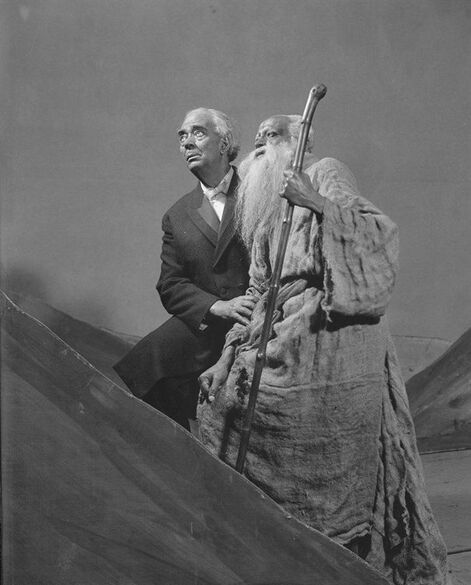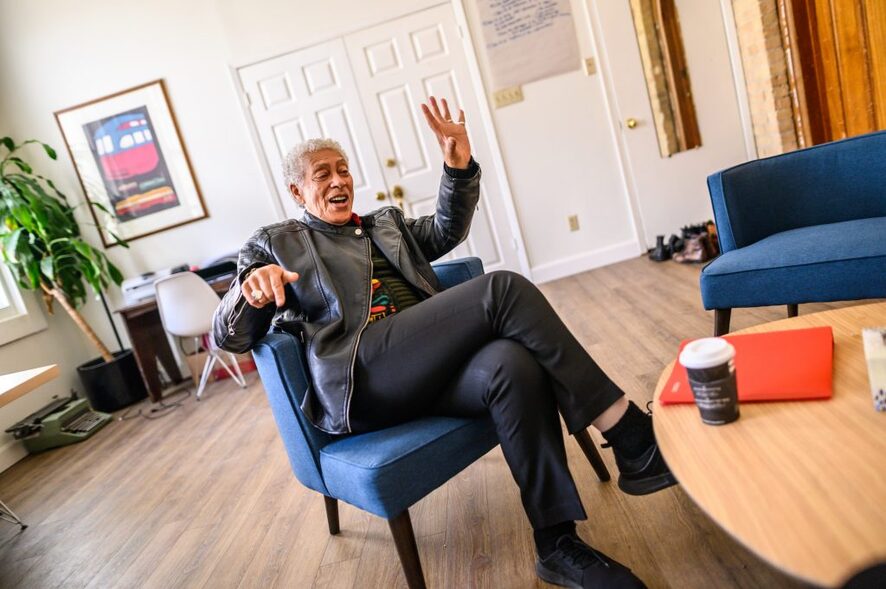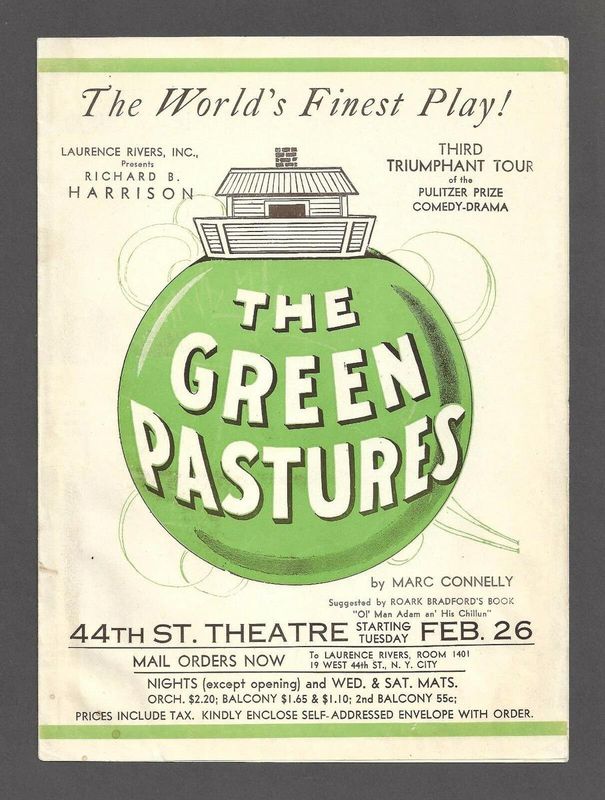
In the 1930s a Black actor from Canada played God in a hit Broadway play — now another Black actor is bringing him back to audiences
By Karen FrickerTheatre Critic
Fri., March 12, 2021 timer 5 min. read
Richard B. Harrison’s name may be little known now, but in the early 1930s he was the toast of Broadway as the star of the long-running hit “The Green Pastures,” in which he played the character of “De Lawd” — in other words, God.
He was Black and hailed from London, Ont., where his parents met having arrived separately in Canada via the Underground Railroad.
A new online one-man theatre piece is bringing this compelling story back into the public eye. Written and directed by Jeff Culbert, “Elocution: The Life of Richard Berry Harrison” stars legendary Canadian actor Walter Borden, who began his theatrical career in Halifax in the 1970s and for many years was the only professional Black actor in the Maritimes.
Borden was immediately compelled by the project. “The moment that I started to read the information that Jeff had given me, I mean, oh, I can’t even describe the feeling. It was immediately something that I knew I had to do,” said Borden. “The parallels were so many, the Underground Railroad aspect.” While one terminus of the railroad was in southern Ontario, “the other one was Nova Scotia, which is how my people got there,” said Borden.
While Harrison showed enormous promise as a young actor, with a particular aptitude for speaking verse, he was blocked from performing in professional productions due to his race. “Once that happened a couple of times, he said, ‘OK, this is not going to work,’” said Culbert. “And so he basically became the grandaddy of every travelling performer, of every fringe performer. He got out on the road and somehow made a living going from town to town, reciting Shakespeare, classical poetry and contemporary poetry.”
Harrison started his public speaking career reciting Shakespeare soliloquies in evening-long variety shows. His first solo show toured to Chatham, London, Hamilton and Toronto in 1891. While touring blossomed in the U.S., Harrison’s Canadian connections continued to be strong: many of his contacts in American communities were through people he knew from back home, and with Canadian expats.
“It was a Canadian out west in California, Arthur G. Wells from Guelph, who made sure Harrison had an office job that would allow him to go around and do his acting work as well,” said Culbert. Wells introduced Harrison to the influential producer L.E. Behymer, who subsequently booked tours for Harrison across the western states.
Harrison made an off-and-on living with his touring shows; it wasn’t until he was 65 that he got his big theatrical break in “The Green Pastures.” Written by Marc Connelly, the play opened in 1930, won the Pulitzer Prize for Drama and was made into a 1936 film (not featuring Harrison).
It’s told through the eyes of a Black child in the American South who interprets Bible stories through her own perspective. Harrison brought his famous voice to his depiction of “De Lawd” and eventually performed in the play over 1,600 times, on Broadway and on tour. In 1934, “The Green Pastures” played three nights at the Grand Theatre in London and the famous local son Harrison was given the freedom of the city. He returned to New York to keep performing in “The Green Pastures” and died in March the following year.
When asked in an interview what it feels like to play God by proxy, Borden said with a twinkle, “Well, it’s not the first time.” In 1983, Borden started a theatre company in Halifax and the first production was “God’s Trombones,” an adaptation of James Weldon Johnson’s book of poems based on Black folk sermons.
“I took those seven sermons and a prayer and added gospel music to it,” recalled Borden. “That’s why I say it’s not the first time because those old preachers were speaking in the place of God. That’s why they were called ‘Trumpets of the Lord’ or ‘God’s Trombones.’”
Since discovering Harrison’s story 10 years ago, Culbert has considered multiple ways of telling it in theatre, including through a multiple-character play. “Harrison was not a bragger and we want to say these wonderful things about him,” said Culbert. “I thought he can’t just stand up and say, ‘I’m so great, I did this and this and this.’ In the end, Culbert found some unpublished transcripts of Harrison talking about his own life, and the solo play that resulted moves back and forth between Harrison telling his story and performing poems and speeches. “It’s a demonstration of the elocution through which he made his living,” said Culbert.
By Karen FrickerTheatre Critic
Fri., March 12, 2021 timer 5 min. read
Richard B. Harrison’s name may be little known now, but in the early 1930s he was the toast of Broadway as the star of the long-running hit “The Green Pastures,” in which he played the character of “De Lawd” — in other words, God.
He was Black and hailed from London, Ont., where his parents met having arrived separately in Canada via the Underground Railroad.
A new online one-man theatre piece is bringing this compelling story back into the public eye. Written and directed by Jeff Culbert, “Elocution: The Life of Richard Berry Harrison” stars legendary Canadian actor Walter Borden, who began his theatrical career in Halifax in the 1970s and for many years was the only professional Black actor in the Maritimes.
Borden was immediately compelled by the project. “The moment that I started to read the information that Jeff had given me, I mean, oh, I can’t even describe the feeling. It was immediately something that I knew I had to do,” said Borden. “The parallels were so many, the Underground Railroad aspect.” While one terminus of the railroad was in southern Ontario, “the other one was Nova Scotia, which is how my people got there,” said Borden.
While Harrison showed enormous promise as a young actor, with a particular aptitude for speaking verse, he was blocked from performing in professional productions due to his race. “Once that happened a couple of times, he said, ‘OK, this is not going to work,’” said Culbert. “And so he basically became the grandaddy of every travelling performer, of every fringe performer. He got out on the road and somehow made a living going from town to town, reciting Shakespeare, classical poetry and contemporary poetry.”
Harrison started his public speaking career reciting Shakespeare soliloquies in evening-long variety shows. His first solo show toured to Chatham, London, Hamilton and Toronto in 1891. While touring blossomed in the U.S., Harrison’s Canadian connections continued to be strong: many of his contacts in American communities were through people he knew from back home, and with Canadian expats.
“It was a Canadian out west in California, Arthur G. Wells from Guelph, who made sure Harrison had an office job that would allow him to go around and do his acting work as well,” said Culbert. Wells introduced Harrison to the influential producer L.E. Behymer, who subsequently booked tours for Harrison across the western states.
Harrison made an off-and-on living with his touring shows; it wasn’t until he was 65 that he got his big theatrical break in “The Green Pastures.” Written by Marc Connelly, the play opened in 1930, won the Pulitzer Prize for Drama and was made into a 1936 film (not featuring Harrison).
It’s told through the eyes of a Black child in the American South who interprets Bible stories through her own perspective. Harrison brought his famous voice to his depiction of “De Lawd” and eventually performed in the play over 1,600 times, on Broadway and on tour. In 1934, “The Green Pastures” played three nights at the Grand Theatre in London and the famous local son Harrison was given the freedom of the city. He returned to New York to keep performing in “The Green Pastures” and died in March the following year.
When asked in an interview what it feels like to play God by proxy, Borden said with a twinkle, “Well, it’s not the first time.” In 1983, Borden started a theatre company in Halifax and the first production was “God’s Trombones,” an adaptation of James Weldon Johnson’s book of poems based on Black folk sermons.
“I took those seven sermons and a prayer and added gospel music to it,” recalled Borden. “That’s why I say it’s not the first time because those old preachers were speaking in the place of God. That’s why they were called ‘Trumpets of the Lord’ or ‘God’s Trombones.’”
Since discovering Harrison’s story 10 years ago, Culbert has considered multiple ways of telling it in theatre, including through a multiple-character play. “Harrison was not a bragger and we want to say these wonderful things about him,” said Culbert. “I thought he can’t just stand up and say, ‘I’m so great, I did this and this and this.’ In the end, Culbert found some unpublished transcripts of Harrison talking about his own life, and the solo play that resulted moves back and forth between Harrison telling his story and performing poems and speeches. “It’s a demonstration of the elocution through which he made his living,” said Culbert.

Photo courtesy of Dahlia Katz Photography

